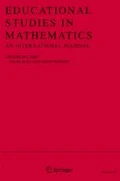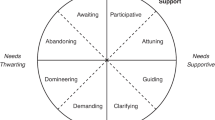Abstract
We discuss a research-based theoretical framework based on affect as an internal representational system. Key ideas include the concepts of meta-affect and affective structures, and the constructs of mathematical intimacy and mathematical integrity. We understand these as fundamental to powerful mathematical problem solving, and deserving of closer attention by educators. In a study of elementary school children we characterize some features of emotional states inferred from individual problem solving behavior, including interactions between affect and cognition. We describe our methodology, illustrating theoretical ideas with brief qualitative examples from a longitudinal series of task-based interviews.
Similar content being viewed by others
References
Dai, D. and Sternberg, R. (eds.): 2004, Motivation, Emotion, and Cognition: Integrative Perspectives on Intellectual Functioning and Development, Lawrence Erlbaum Associates, Mahwah, NJ.
Damasio, A.: 1994, Descartes' Error: Emotion, Reason, and the Human Brain, Avon Books, New York, NY.
DeBellis, V.: 1996, Interactions Between Affect and Cognition During Mathematical Problem Solving: A Two-year Case Study of Four Elementary School Children, Doctoral Dissertation, Ann Arbor, MI: University Microfilms No. 96–30716, Rutgers University, New Brunswick, NJ.
DeBellis, V.: 1998, ‘Mathematical intimacy: Local affect in powerful problem solvers’, in S. Berenson et al. (eds.), Proceedings of the Twentieth Annual Meeting of PME-NA, Vol. 2, Columbus, Ohio: ERIC, pp. 435–440.
DeBellis, V. and Goldin, G.: 1997, ‘The affective domain in mathematical problem solving’, in E. Pehkonen (ed.), Proceedings of the Twenty-First Annual Meeting of PME, Vol. 2, Lahti, Finland: Univ. of Helsinki, pp. 209–216.
DeBellis, V. and Goldin, G.: 1999, ‘Aspects of affect: Mathematical intimacy, mathematical integrity’, in O. Zaslavsky (ed.), Proceedings of the Twenty-third Annual Meeting of PME, Vol.2, Haifa, Israel: Technion Printing Center, pp. 249–256.
Goldin, G.: 1998a, ‘Representational systems, learning, and problem solving in mathematics’, Journal of Mathematical Behavior 17(2), pp. 137–165.
Goldin, G.: 1998b, ‘Observing mathematical problem solving through task-based interviews’, in A. Teppo (ed.), Qualitative Research Methods in Mathematics Education, Journal for Research in Mathematics Education Monograph No. 9, Reston, Virginia: National Council of Teachers of Mathematics, pp. 40–62.
Goldin, G.: 2000, ‘Affective pathways and representation in mathematical problem solving’, Mathematical Thinking and Learning 2, 209–219.
Goldin, G.: 2002, ‘Affect, meta-affect, and mathematical belief structures’, in G. Leder, E. Pehkonen and G. Törner, (eds.), Beliefs: A Hidden Variable in Mathematics Education?, Kluwer, Dordrecht, The Netherlands, pp. 59–72.
Goldin, G.: in press, ‘Aspects of affect and mathematical modeling processes’, in R. Lesh, J. Kaput and E. Hamilton (eds.), Foundations for the Future in Mathematics Education Curriculum, Erlbaum, Mahwah, NJ.
Goldin, G., DeBellis, V., DeWindt-King, A., Passantino, C. and Zang, R.: 1993, ‘Task-based interviews for a longitudinal study of children's mathematical development’, in I. Hirabayashi et al. (eds.), Proceedings of the Seventeenth Annual Meeting of PME, Vol. 1, University of Tsukuba, pp. 197–203.
Goldin, G. and Kaput, J.: 1996, ‘A joint perspective on the idea of representation in learning and doing mathematics’, in L. Steffe, P. Nesher, P. Cobb, G. Goldin, and B. Greer (eds.), Theories of Mathematical Learning, Erlbaum, Hillsdale, NJ, pp. 397–430.
Gomez-Chacon, I.: 2000, ‘Affective influences in the knowledge of mathematics’, Educational Studies in Mathematics 43, 149–168.
Lesh, R. and Doerr, H. (eds.): 2003, Beyond Constructivism: Models and Modeling Perspectives on Mathematics Problem Solving, Learning, and Teaching, Erlbaum, Mahwah, NJ.
McLeod, D.: 1989, ‘Beliefs, attitudes and emotions: New views of affect in mathematics education’, in D. McLeod and V. Adams (eds.), Affect and Mathematical Problem Solving: A New Perspective, Springer, NY, pp. 245–258.
McLeod, D. and Adams, V. (eds.): 1989, Affect and Mathematical Problem Solving: A New Perspective, Springer-Verlag New York Inc.
Op't Eynde, P. and DeCorte, E.: 2005, Accepting emotional complexity: A component systems approach of emotions in the mathematics classroom (authors' preprint).
Vinner, S.: 1997, ‘From intuition to inhibition: Mathematics, education, and other endangered species', in E. Pehkonen (ed.), Proceedings of the Twenty-first Annual Meeting of PME, Vol. 1, Lahti, Finland, University of Helsinki, pp. 63–78.
Author information
Authors and Affiliations
Corresponding author
Rights and permissions
About this article
Cite this article
DeBellis, V.A., Goldin, G.A. Affect and Meta-Affect in Mathematical Problem Solving: a Representational Perspective. Educ Stud Math 63, 131–147 (2006). https://doi.org/10.1007/s10649-006-9026-4
Received:
Accepted:
Published:
Issue Date:
DOI: https://doi.org/10.1007/s10649-006-9026-4




